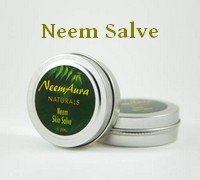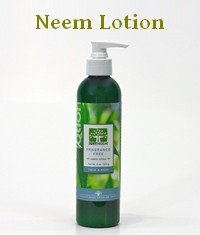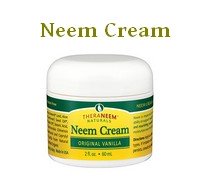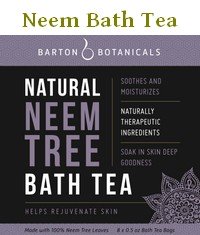Neem Oil And Eczema
A Natural Herbal Remedy For Eczema?
This page explains how neem oil can help eczema sufferers and why natural remedies are the best treatment for eczema.
You will often find neem oil touted as an effective herbal remedy for eczema...
Now, neem oil sure is effective, but it's not a cure for eczema.
There is, however, no doubt that neem is one of the best natural remedies for eczema symptoms available today.
Neem, if used in the right way, can relieve eczema symptoms, but it can not remove the root causes for eczema.
What Exactly Is Eczema, And What Are The Causes For Eczema?
Eczema is ultimately an allergic reaction.
It is a very common inflammatory skin disorder, characterized by extremely irritable, dry, red, itchy skin.
The itchiness can be unbearable. Scratching (and most people don't manage not to scratch) makes eczema much worse.
The skin then really flares up, it can become raw, cracked, crusted, weep, and people get secondary infections.
The root cause for eczema lies in our genes, so eczema usually runs in families. Eczema sufferers are abnormally sensitive to common allergens, like pollen, dust or house mites, household chemicals, cosmetics... It's not only the skin that is affected. People with eczema often go on to develop other allergies, like asthma or hay fever.
Eczema is also called dermatitis, or more specifically, atopic dermatitis. There are several types of dermatitis and eczema, but the atopic dermatitis, or atopic eczema, is the most common. This is what people usually mean when they say eczema.
"Atopic" refers to a lifelong tendency to allergies, like skin disorders, asthma or hay fever. And just like there is no cure for asthma, there is also no cure for eczema.
Eczema usually begins very early in life (infantile or baby eczema), most often before age 5. As many as 20% of children are affected, but most eventually grow out of it. It can flare up again later in life. Only 1-2% of adults suffer from eczema but it is becoming more and more common overall.
Herbal Remedies For Eczema:
Where Does Neem Oil Come Into It?
The first important thing to do for eczema sufferers is to avoid anything that can trigger a skin reaction. The list of possible triggers is long...
Contact with animals, sudden changes in temperature or humidity, tight or scratchy clothing, wool, cleaning products, detergents, perfume, certain foods, sweating, medication, stress, mold, smog, dust...
The most important trigger to avoid is dryness. Dryness really is the biggest problem. With eczema the barrier function of the skin is less effective, which causes the skin to lose a lot of water. The resulting dryness causes the intense itch. Itching is the first symptom, before the rash or redness and everything else. But then you scratch, and the rest follows from there...
Neem oil can't protect you from sweating or dust, but it can prevent your skin from drying out. Everybody who has done just a little bit of reading about neem knows that neem oil is a great emollient and is especially recommended for dry skin.
Emollients are what dermatologists recommend for eczema. Emollients, emollients, emollients. Substances that fill the gaps and cracks in the skin, prevent moisture loss, and restore the protective barrier.
Daily moisturizing is the basis of any eczema treatment, and even while eczema is under control it's important to continue the moisturizing regime to prevent future flare ups. Nothing is as important as keeping the skin hydrated. It is the most important step in treating eczema with neem or otherwise.
But neem does more than that, and that's what sets it apart from other emollients and oils.
Neem is anti-inflammatory and can reduce the redness and irritation. The two main anti-inflammatory substances in neem are called nimbin and nimbidin, and they have been shown to have anti-inflammatory properties comparable to common non-steroids (phenylbutazone) and steroidal drugs (prednisone). (Sources)
Neem is also a strong analgesic (pain killer). Some people report instant relief from the excruciating discomfort, as soon as they apply neem salve or cream to eczema skin.
And neem is antibacterial and can clean up any secondary infections, or even better, prevent them from happening in the first place.
In short, on top of moisturizing eczema skin, neem can do many of the things that steroid creams, antibiotics and antihistamines do, but it doesn't have any of the side effects.
Research suggests that neem may be at least as effective in relieving eczema symptoms as over-the-counter and prescription medications. (Sources)
Indians agree. They have used neem for thousands of years in Ayurvedic remedies that successfully treat eczema and a range of other inflammatory skin disorders.
A chemical free, neem based lotion can dramatically relieve eczema symptoms and aid skin regeneration.
And once eczema is under control, a suitable mild skin care regime based on neem can prevent future flare ups.
Eczema is a condition that most often affects babies and young children, and this makes an effective, safe natural remedy for eczema symptoms especially valuable.
Neem is the safest eczema treatment, and the most effective herbal remedy for eczema symptoms available today.
How To Use Neem Oil As An Eczema Remedy
You have to avoid soap based cleansers, because they dry the skin. This includes most neem soap, which is great for other skin conditions, but not for eczema!
Rather use soap free cream cleansers, neem creams, neem lotion, salve/ointment.
Neem products for eczema can contain both neem oil and neem leaf extract.
The neem leaves are often overlooked by Westerners, yet it is the neem leaf that is used in traditional Ayurvedic medicine to treat skin disorders like eczema.
You can also mix neem oil with bath water. Dermatologist recommend bathing over showering. (Only luke warm baths! And don't add any bubble bath or perfumed stuff etc. You'd regret it. If you are suffering from eczema you know that already.)
To maximize the hydrating effect of the bath on eczema add the neem oil towards the end. Or add neem leaf extract right at the start. You can make a strong cup of tea from fresh or dried neem leaves or use a neem tea bag specifically designed for baths.
Use a neem cream or neem lotion immediately afterwards on your still moist skin to lock in the moisture. A lotion or cream is a lot more effective in restoring the skin barrier than a bath is.
There is no point in rubbing straight neem oil on eczema and expecting miracles. Don't do it!
Straight neem oil is very strong stuff. If skin is already irritated, and in eczema it sure is, you may even get a contact dermatitis like reaction. In other words, it will make things much worse!
A neem salve like this one is a much more sensible option.
Also, not all neem oils are made equal. Raw, cold-pressed neem oil is a natural product (and stinks!), but many neem oils for sale are refined extracts, and some of them may contain solvent residues. Bad!
Ideally you should get neem products that have been specifically developed for eczema and similar skin disorders.
Do your homework before buying any neem oil for eczema, or any neem products. What you want is a good, natural, chemical free product. Not some chemical based lotion that has a bit of token neem oil or neem extract added to it.
Most sellers of neem oil products are proud of the quality of their natural and organic products, and they'll tell you exactly what's in them. They will also tell you where their neem oil comes from and how it was processed.
If you can't find out the ingredients, don't use the stuff. It's as simple as that.
Sources:
Phytother Res. 2004 May;18(5):419-24. Nimbidin suppresses functions of macrophages and neutrophils: relevance to its antiinflammatory mechanisms.
Planta Med. 1981 Sep;43(9):59-63. Anti-arthritic and anti-inflammatory actions of nimbidin.
David, S.N. (1978) Effect of neem oil and its constituents on cotton pellet inflammation. Mediscope. 20: 273-274.



